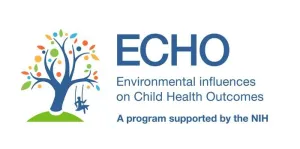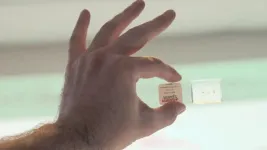(Press-News.org) In pausing to think before making an important decision, we may imagine the potential outcomes of different choices we could make. While this “mental simulation” is central to how we plan and make decisions in everyday life, how the brain works to accomplish this is not well understood.
An international team of scientists has now uncovered neural mechanisms used in planning. Its results, published in the journal Nature Neuroscience, suggest that an interplay between the brain’s prefrontal cortex and hippocampus allows us to imagine future outcomes in order to guide our decisions.
“The prefrontal cortex acts as a ‘simulator,’ mentally testing out possible actions using a cognitive map stored in the hippocampus,” explains Marcelo Mattar, an assistant professor in New York University’s Department of Psychology and one of the paper’s authors. “This research sheds light on the neural and cognitive mechanisms of planning—a core component of both human and animal intelligence. A deeper understanding of these brain mechanisms could ultimately improve the treatment of disorders affecting decision-making abilities.”
The roles of both the prefrontal cortex—used in planning and decision-making—and hippocampus—used in memory formation and storage—have long been established. However, their specific duties in deliberative decision-making, which are the types of decisions that require us to think before acting, are less clear.
To illuminate the neural mechanisms of planning, Mattar and his colleagues—Kristopher Jensen, a computational neuroscientist at University College London, and Guillaume Hennequin, a professor of computational neuroscience at the University of Cambridge—developed a computational model to predict brain activity during planning. They then analyzed data from both humans and laboratory rats* to confirm the validity of the model—a recurrent neural network (RNN), which learns patterns based on incoming information.
The model took into account existing knowledge of planning and added new layers of complexity, including “imagined actions,” thereby capturing how decision-making involves weighing the impact of potential choices—similar to how a chess player envisions sequences of moves before committing to one. These mental simulations of potential futures, modeled as interactions between the prefrontal cortex and hippocampus, enable us to rapidly adapt to new environments, such as taking a detour after finding that a road is blocked.
The scientists validated this computational model using both behavioral and neural data. To assess the model’s ability to predict behavior, the scientists conducted a novel experiment measuring how humans navigated an online maze on a computer screen and how long they had to think before each step. To validate the model’s predictions about the role of the hippocampus in planning, they analyzed neural recordings from rodents navigating a physical maze configured in the same way as in the human experiment. By giving a similar task to humans and rats, the researchers could draw parallels between the behavioral and neural data—a particularly innovative aspect of this research.
The experimental results were consistent with the computational model, showing an intricate interaction between the prefrontal cortex and hippocampus. In the human experiments, participants’ brain activity reflected more time thinking before acting in navigating the maze. In the experiments with laboratory rats, the animals’ neural responses in moving through the maze resembled the model’s simulations.
“Overall, this work provides foundational knowledge on how these brain circuits enable us to think before we act in order to make better decisions,” observes Mattar. “In addition, a method in which both human and animal experimental participants and RNNs were all trained to perform the same task offers an innovative and foundational way to gain insights into behaviors.”
*University of California, Berkeley neurophysiology researchers John Widolski and David Foster provided the neural data taken from experiments with laboratory rats used in the paper’s analysis.
DOI: 10.1038/s41593-024-01675-7
# # #
END
What’s going on in our brains when we plan?
Study uncovers how the brain simulates possible future actions by drawing from our stored memories
2024-06-07
ELSE PRESS RELEASES FROM THIS DATE:
Robotic device restores wavelike muscular function involved in processes like digestion, aiding patients with compromised organs
2024-06-07
A team of Vanderbilt researchers has developed a wirelessly activated device that mimics the wavelike muscular function in the esophagus and small intestine responsible for transporting food and viscous fluids for digestion.
The soft-robotic prototype, which is driven by strong magnets controlled by a wearable external actuator, can aid patients suffering from blockages caused by tumors or those requiring stents. For example, traditional esophageal stents are metal tubes used in patients with esophageal cancer, mostly in an aging population. These patients risk food being blocked from entering the stomach, potentially ...
DOE announces new decadal fusion energy strategy
2024-06-07
WASHINGTON, D.C.—The U.S. Department of Energy (DOE) today marked the two-year anniversary of the Biden-Harris Administration's launch of the U.S. Bold Decadal Vision for Commercial Fusion Energy with the release of the DOE Fusion Energy Strategy 2024 and an event at the White House co-hosted by the White House Office of Science and Technology Policy.
At the inaugural event where the Bold Decadal Vision was unveiled, DOE launched a Department-wide initiative to develop a strategy for accelerating the viability of commercial fusion energy in partnership with the private sector. The newly released DOE Fusion Energy ...
Study identifies potential pathway to reducing breast cancer brain metastases
2024-06-07
A study led by researchers from the University of Arizona Cancer Center at UArizona Health Sciences identified a biological mechanism that could lead to more effective treatments for breast cancer that has metastasized to the brain.
By studying the metabolic differences between primary breast cancer cells and those that metastasize to the brain, they determined that autophagy was significantly upregulated in brain metastases. Autophagy is a cellular recycling process that cancer cells can use to stay alive when faced with stressful conditions such as those triggered by anticancer drugs.
“The prognosis for individuals with ...
How does oxygen depletion disrupt memory formation in the brain?
2024-06-07
When we learn something new, our brain cells (neurons) communicate with each other through electrical and chemical signals. If the same group of neurons communicate together often, the connections between them get stronger. This process helps our brains learn and remember things and is known as long-term potentiation or LTP.
Another type of LTP occurs when the brain is deprived of oxygen temporarily – anoxia-induced long-term potentiationor aLTP. aLTP blocks the former process, thereby impairing learning and ...
Study investigates relationship between phthalate exposure and high blood pressure, related complications during pregnancy
2024-06-07
Higher exposure to certain chemicals called phthalates is linked to an increased risk of pregnancy complications, including preeclampsia and eclampsia (PE/E) and other hypertensive or high blood pressure disorders, according to a study funded by the NIH Environmental influences on Child Health Outcomes program. Here are the key findings:
Doubling the levels of a specific molecule linked to exposure to phthalates found in PVC plastics and insect repellents—mono (3-carboxypropyl) phthalate (MCPP)—increased ...
YALE NEWS: Study finds no association between COVID-19 vaccines and stillbirths
2024-06-07
New Haven, Conn. — In a new study funded by the U.S. Centers for Disease Control and Prevention, researchers from Yale and 11 other institutions found “no association between COVID-19 vaccination and stillbirth.”
In a case-control study led by Yale School of Medicine’s Dr. Anna Denoble, researchers compared 276 stillbirths with 822 live births during a one-year period from February 2021 to February 2022. Their results, published June 6 in the journal Obstetrics & Gynecology, found no linkage between pregnant individuals ...
University of South Florida using AI to help combat malaria in Africa
2024-06-06
Media Contact:
John Dudley
(814) 490-3290 (cell)
jjdudley@usf.edu
TAMPA, Fla. (June 6, 2024) – University of South Florida researchers are using artificial intelligence to revolutionize mosquito surveillance to help combat malaria in Africa. Ryan Carney, professor of integrative biology, and Sriram Chellappan, professor in the department of computer science and engineering, will collaborate with an interdisciplinary team of researchers to advance malaria research and explore innovative solutions ...
Webb finds plethora of carbon molecules around young star
2024-06-06
An international team of astronomers has used NASA’s James Webb Space Telescope to study the disk of gas and dust around a young, very low-mass star. The results reveal the largest number of carbon-containing molecules seen to date in such a disk. These findings have implications for the potential composition of any planets that might form around this star.
Rocky planets are more likely than gas giants to form around low-mass stars, making them the most common planets around the most common stars in our galaxy. Little is known about the chemistry of such worlds, which may be similar to or very different from Earth. By studying the disks from which such planets form, astronomers hope ...
Study finds home health aides struggle with mental health
2024-06-06
Study Finds Home Health Aides Struggle with Mental Health
Home health aides (HHAs) are vulnerable to stress, isolation and depressive symptoms, which impact their own health as well as their patients’ desire to age in place, according to Weill Cornell Medicine researchers. HHAs are a rapidly growing workforce trained and certified to provide personal and medical care, as well as emotional support, in the home.
“As a doctor, I’ve learned that home health aides are a critical part of patients’ well-being,” said senior author Dr. Madeline Sterling, ...
Researchers develop microneedle patch to reverse hair loss caused by autoimmune disease
2024-06-06
Alopecia areata (AA) is an autoimmune disease characterized by hair loss, which occurs when T cells of the immune system mistakenly attack hair follicles. To restore control over hyperactive immune cells, investigators from Brigham and Women’s Hospital, a founding member of the Mass General Brigham healthcare system, and MIT developed a cutting-edge approach to deliver T cell regulators directly to sites of hair loss and halt autoimmune activity. Findings, published in Advanced Materials, demonstrated marked and lasting increases in hair regrowth in models of the disease.
Our immune system evolved to safeguard against the overactivation that occurs when it mistakenly attacks ...
LAST 30 PRESS RELEASES:
This ancient plant-eater had a twisted jaw and sideways-facing teeth
Jackdaw chicks listen to adults to learn about predators
Toxic algal bloom has taken a heavy toll on mental health
Beyond silicon: SKKU team presents Indium Selenide roadmap for ultra-low-power AI and quantum computing
Sugar comforts newborn babies during painful procedures
Pollen exposure linked to poorer exam results taken at the end of secondary school
7 hours 18 mins may be optimal sleep length for avoiding type 2 diabetes precursor
Around 6 deaths a year linked to clubbing in the UK
Children’s development set back years by Covid lockdowns, study reveals
Four decades of data give unique insight into the Sun’s inner life
Urban trees can absorb more CO₂ than cars emit during summer
Fund for Science and Technology awards $15 million to Scripps Oceanography
New NIH grant advances Lupus protein research
New farm-scale biochar system could cut agricultural emissions by 75 percent while removing carbon from the atmosphere
From herbal waste to high performance clean water material: Turning traditional medicine residues into powerful biochar
New sulfur-iron biochar shows powerful ability to lock up arsenic and cadmium in contaminated soils
AI-driven chart review accurately identifies potential rare disease trial participants in new study
Paleontologist Stephen Chester and colleagues reveal new clues about early primate evolution
UF research finds a gentler way to treat aggressive gum disease
Strong alcohol policy could reduce cancer in Canada
Air pollution from wildfires linked to higher rate of stroke
Tiny flows, big insights: microfluidics system boosts super-resolution microscopy
Pennington Biomedical researcher publishes editorial in leading American Heart Association journal
New tool reveals the secrets of HIV-infected cells
HMH scientists calculate breathing-brain wave rhythms in deepest sleep
Electron microscopy shows ‘mouse bite’ defects in semiconductors
Ochsner Children's CEO joins Make-A-Wish Board
Research spotlight: Exploring the neural basis of visual imagination
Wildlife imaging shows that AI models aren’t as smart as we think
Prolonged drought linked to instability in key nitrogen-cycling microbes in Connecticut salt marsh
[Press-News.org] What’s going on in our brains when we plan?Study uncovers how the brain simulates possible future actions by drawing from our stored memories





